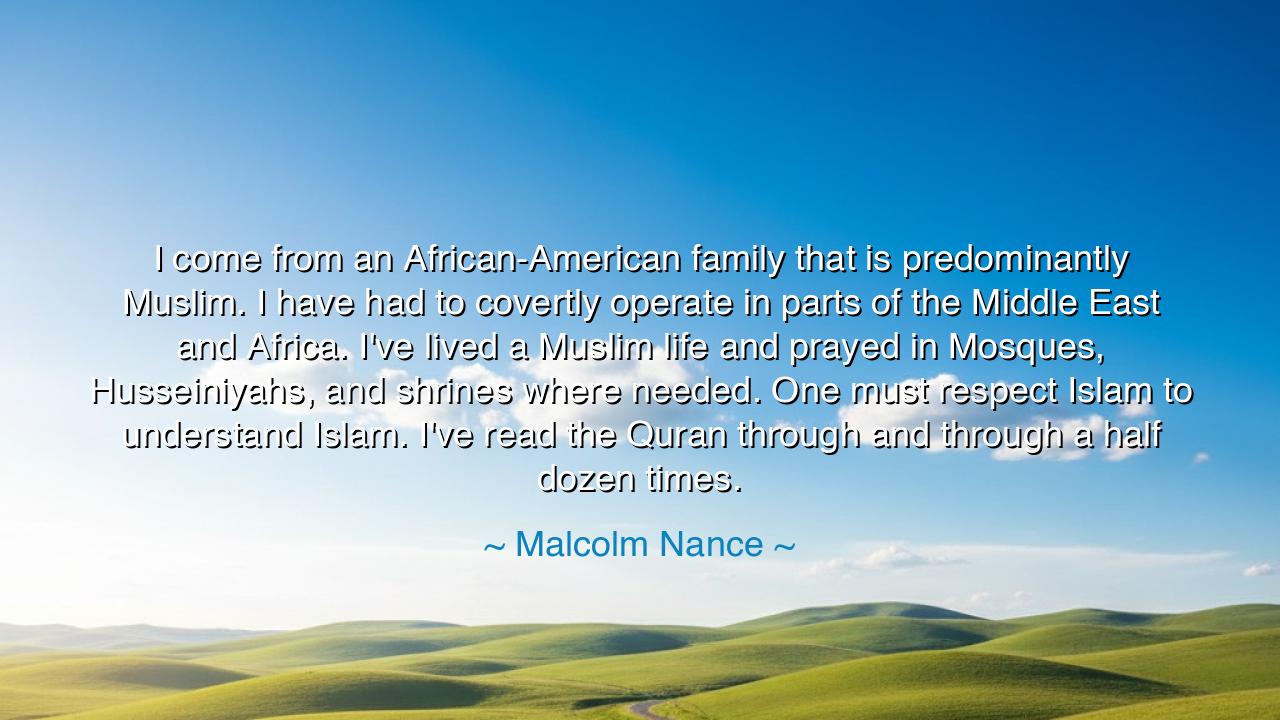
I come from an African-American family that is predominantly
I come from an African-American family that is predominantly Muslim. I have had to covertly operate in parts of the Middle East and Africa. I've lived a Muslim life and prayed in Mosques, Husseiniyahs, and shrines where needed. One must respect Islam to understand Islam. I've read the Quran through and through a half dozen times.






In the vast expanse of human experience, there are few journeys as complex and rich as that of understanding a culture, a religion, and the life that shapes one's identity. Malcolm Nance, in his words, reveals a truth that echoes through the centuries: "I come from an African-American family that is predominantly Muslim. I have had to covertly operate in parts of the Middle East and Africa. I've lived a Muslim life and prayed in Mosques, Husseiniyahs, and shrines where needed. One must respect Islam to understand Islam. I've read the Quran through and through a half dozen times." These words are not just a personal testament, but a call to embrace the complexity and depth of human faith and identity.
In the wisdom of the ancients, the quest for understanding was seen not merely as an intellectual pursuit, but a deeply spiritual one. Socrates famously said, "The unexamined life is not worth living." But the true examination is not of one’s own life alone—it extends to the understanding of others, to cultures, to beliefs, and to the diversity of human existence. Malcolm Nance’s assertion that one must respect Islam to understand it is an ancient truth: to comprehend another's faith, one must first approach it with humility, respect, and a willingness to learn. This echoes the teachings of Confucius, who believed that understanding between peoples and cultures was grounded in mutual respect.
The journey Nance speaks of—a journey through the Middle East and Africa, through Mosques, Husseiniyahs, and shrines—is a reflection of the ancient practice of pilgrimage, a sacred journey undertaken by many to deepen one’s understanding of the world and the divine. Just as the Hajj in Islam calls the faithful to visit the holy city of Mecca, so too did ancient peoples embark on pilgrimages to sacred sites of knowledge and faith. The pilgrim, whether to a physical location or into the depths of a belief, does not return unchanged. In this sense, Nance's journey to understand Islam is no different from the ancients who sought understanding not only of their own hearts but of the hearts of those they encountered.
Respect for another's faith is not merely an act of tolerance but an act of wisdom. The Quran, a text that Nance has read multiple times, is not simply a book; it is a key to understanding the hearts of millions. The study of sacred texts, whether the Torah, the Bible, or the Quran, has always been seen as a path to understanding the divine and the world in which we live. Rumi, the great Sufi mystic, spoke of the universe being a vast book, where the pages are the peoples and faiths that make up humanity. To understand Islam—or any faith—is to open oneself to the wisdom that exists in its texts and its practice, to approach it not with prejudice but with a mind open to the possibility of new insights into the nature of truth and life.
In this modern age, where the world is often divided along lines of religion, ethnicity, and belief, Nance's words remind us of the importance of stepping beyond the boundaries of division. His recognition that one must respect a faith to understand it is a call to embrace the richness of diversity in all its forms. The ancient Romans knew that to be a citizen of their empire required not just loyalty but a broadness of mind that could respect the many peoples and religions under their rule. To see each faith and culture as a reflection of the human spirit—and to engage with it deeply—is to walk the path of the ancients, who recognized that true wisdom comes not from isolation but from engagement with the wider world.
As we reflect on Nance’s words, the lesson is clear: to understand the faith of others, we must be willing to immerse ourselves in their worlds, to not only respect their practices but to live them, if only in part. Just as Malcolm Nance has done, we too must approach the Quran and all sacred texts with the intent not simply to read but to understand and engage. This journey is not one of mere intellectual pursuit but of spiritual transformation, one that calls us to look beyond our own experiences and to engage with the faiths and beliefs of others as a path to greater wisdom and compassion.
Finally, let us heed the ancient call to unity through understanding. As Malcolm Nance shows, the act of immersing oneself in another’s faith is not an act of mere academic curiosity—it is an act of respect, of seeking a deeper connection with the divine and the human that transcends the boundaries of geography, race, and religion. In our own lives, let us seek not only to understand the faiths of others but to live with the compassion and respect that will bring us closer to the heart of humanity. For in understanding each other, we move one step closer to understanding the truth that binds us all.






AAdministratorAdministrator
Welcome, honored guests. Please leave a comment, we will respond soon